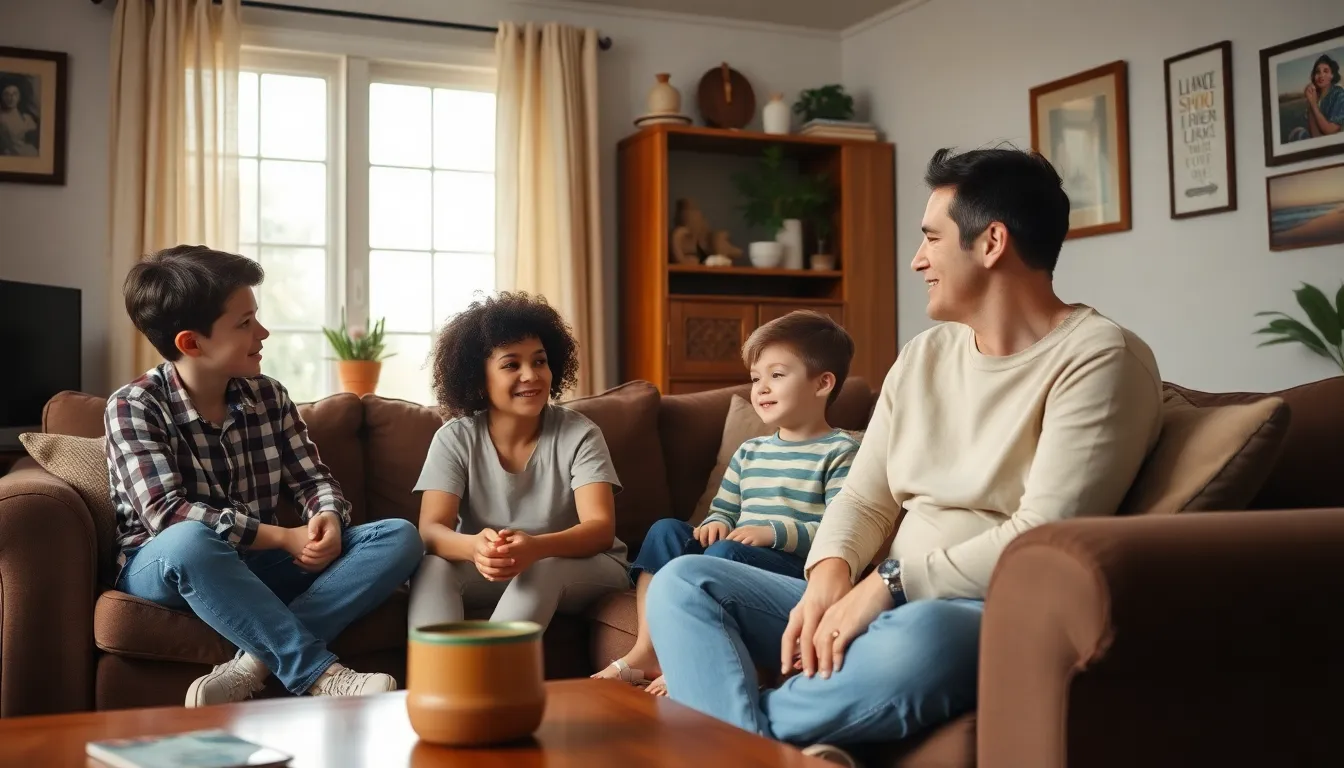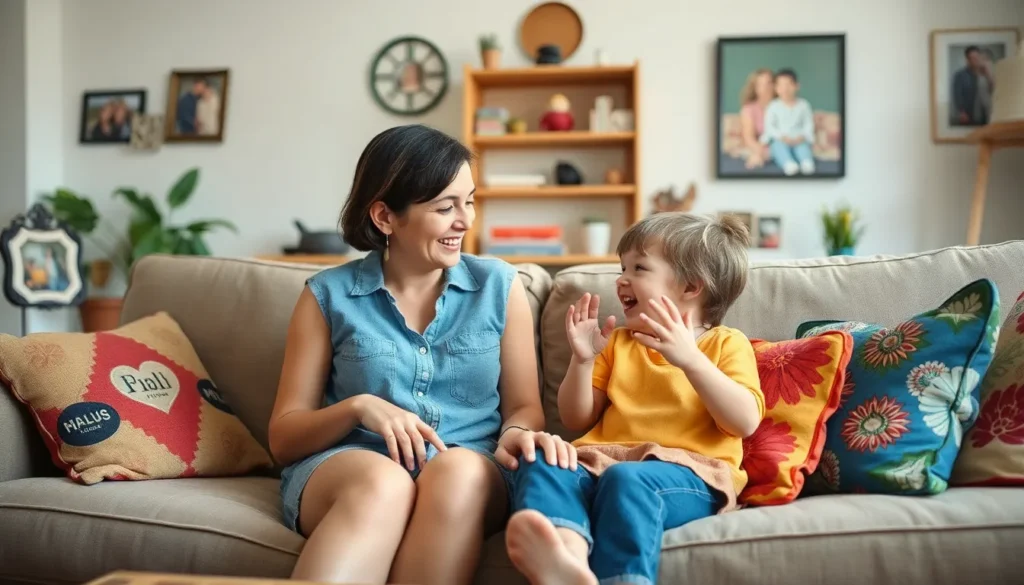Table of Contents
ToggleSingle parents juggle a lot—work, kids, and the occasional existential crisis. Amid the chaos, effective communication can feel like trying to find a sock in a laundry basket full of mismatched pairs. But fear not! Mastering the art of conversation can transform those hectic family moments into opportunities for connection and understanding.
Whether it’s navigating tricky conversations with kids or collaborating with co-parents, honing communication skills is essential. With a sprinkle of humor and a dash of patience, single parents can foster an environment where everyone feels heard. So grab a cup of coffee (or a glass of wine—we won’t judge) and dive into these practical tips that’ll make communicating smoother than a toddler’s tantrum on a sugar high.
Importance of Communication for Single Parents
Effective communication plays a crucial role in the lives of single parents. Clear dialogue fosters strong connections with children and promotes understanding. Regular conversations create an atmosphere of openness and trust, allowing children to express their thoughts and feelings.
Strong communication skills enable single parents to manage stress better. They provide tools for addressing conflicts with co-parents and balancing household responsibilities. Open lines of communication reduce misunderstandings and support collaboration on parenting decisions.
Establishing a routine for communication helps maintain consistency. Scheduled times for family discussions or check-ins ensure everyone stays informed and heard. This practice encourages children to participate in problem-solving, reinforcing their sense of responsibility.
Listening actively boosts confidence in children. Parents should validate their feelings and demonstrate empathy. When children feel understood, they’re more likely to share important information and concerns.
Setting boundaries around communication is essential. Clear expectations prevent overstepping and encourage respectful exchanges. Establishing guidelines ensures productive discussions and reduces potential conflicts.
Finally, adaptability in communication styles is vital. Different situations may require various approaches, from being assertive when discussing rules to showing empathy during emotional moments. Adjusting communication techniques allows single parents to respond effectively to their children’s needs.
Improving communication skills strengthens family bonds, helps navigate challenges, and contributes to a positive home environment.
Effective Communication Strategies

Effective communication enhances connections in single-parent families. Implementing specific strategies can significantly improve interactions.
Active Listening Techniques
Active listening fosters deeper understanding. Focus on the speaker by making eye contact and nodding to show engagement. Paraphrasing what the child says demonstrates comprehension and validation of their feelings. Encourage open dialogue by asking open-ended questions, which inspires children to express their thoughts. Avoid interrupting, allowing children to complete their ideas before responding. These techniques create a safe space for sharing and enhance emotional bonds.
Clear and Honest Expression
Clear and honest expression builds trust. Use simple language to convey thoughts effectively, ensuring children grasp the message. Share feelings openly, highlighting the importance of emotional transparency. Encourage parents to discuss daily experiences and challenges, forming a routine for communication. Establish guidelines that promote respectful dialogue, fostering a positive atmosphere. When emotions run high, identifying feelings and communicating them aids in conflict resolution. This honesty cultivates a supportive environment that values shared experiences and understanding.
Setting Boundaries and Expectations
Setting clear boundaries and expectations fosters healthier communication for single parents. Open dialogue with co-parents and children creates a foundation of trust and understanding.
Communicating with Co-Parents
Effective communication with co-parents involves clarity and respect. Addressing schedules and responsibilities directly strengthens partnership. Keeping conversations focused on children’s needs encourages cooperative decision-making. Consistent check-ins allow both parents to stay aligned on parenting approaches. This alignment reduces conflict and creates a unified front for children. Utilizing shared calendars or apps enhances the organization and visibility of commitments. Openly discussing feelings about co-parenting challenges helps maintain a positive relationship.
Discussing Discipline and Rules with Children
Discussions about discipline and rules should be straightforward and age-appropriate. Clearly outlining expectations empowers children to understand family guidelines. Engaging in conversations about consequences allows for shared understanding of boundaries. Active listening during these discussions ensures that children’s perspectives are valued. Openly inviting questions encourages dialogue and clarity. Consistently revisiting rules helps children adapt to changing circumstances. Positive reinforcement for following guidelines creates a supportive environment that reinforces cooperation.
Building a Supportive Network
Creating a strong support network benefits single parents, providing both emotional and practical assistance. Connections can foster a sense of community and encourage sharing of resources and experiences.
Connecting with Other Single Parents
Joining local or online groups connects single parents facing similar challenges. These groups promote understanding and allow sharing of experiences. Parents can exchange tips and resources, helping navigate difficulties together. Participating in social events encourages bonding, while establishing friendships provides emotional support during tough times. Many communities offer meetups or support groups designed specifically for single parents, fostering a safe environment to share concerns. Regular interactions deepen relationships, making parents feel less isolated.
Seeking Professional Help if Needed
Consulting with professionals offers valuable guidance for single parents facing overwhelming challenges. Therapists or counselors can help process emotions and develop coping strategies. Workshops focusing on communication skills enhance interactions with children and co-parents. Child psychologists provide insights into children’s behavior and emotional needs, contributing to healthier family dynamics. Access to parenting classes equips parents with effective techniques, fostering a positive environment. Reaching out for professional help shows strength and commitment to personal growth and family well-being.
Effective communication is essential for single parents navigating the complexities of family life. By implementing the strategies discussed, they can foster stronger connections with their children and co-parents. Active listening and open dialogue create an atmosphere of trust and understanding, enabling families to thrive.
Establishing routines and setting clear boundaries further enhances communication, making it easier to address challenges. Connecting with other single parents and seeking professional support can provide additional resources and encouragement. Ultimately, prioritizing communication not only strengthens family bonds but also cultivates a positive and nurturing home environment.




